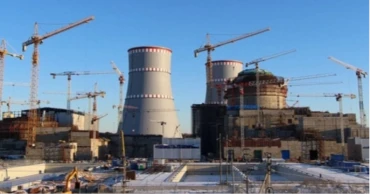uranium
Sixth batch of uranium for RNPP arrives in Rooppur amid tight security
The sixth consignment of uranium for the first unit of Rooppur Nuclear Power Project has arrived in Pabna’s Rooppur under special security arrangement.
Pabna Superintendent of Police Akbar Ali Munshi confirmed that the convoy carrying uranium entered the project area at 8:30 am on Friday.
SP Akbar said the convoy carrying uranium left the capital in the morning and crossed Bangabandhu Bridge and reached Rooppur project area via Banpara in Natore and Dashuria in Pabna's Ishwardi.
Fifth batch of uranium for RNPP arrives in Rooppur amid tight security
He added that law enforcement agencies were working to ensure tight security in view of the arrival of uranium. Besides, vehicular movement on the highway from Dhaka to Rooppur in the project area was suspended from 5am to 10am.
However, traffic movement was restored when the uranium consignment entered the Rooppur project area, said the SP.
Earlier on September 28, the first consignment of fuel for the Rooppur Nuclear Power Project arrived in Bangladesh. The next day, on September 29, fuel was taken to the project area under special security measures.
Fourth batch of uranium for RNPP reaches Rooppur amid tight security
The consignment was formally handed over in the presence of Prime Minister Sheikh Hasina and Russian President Vladimir Putin through a video conference on October 5, marking Bangladesh’s entry to the world’s elite club of nuclear power producers.
On January 15, 2013, an agreement regarding State Export Credit of US$ 500 million was signed for carrying out preparatory phase construction works of Rooppur Nuclear Power Plant.
The government signed a US$12.65 billion general contract (GC) in 2015 with Moscow for building the nuclear power plant.
Bangladesh signed a credit agreement with Russia to obtain $11.385 billion credit for RNPP in July 2016. The credit covers 90 percent of the project cost.
Russia to take back spent fuel of Rooppur nuclear power plant: PM Hasina tells fuel handing ceremony
The Ministry of Science and Technology recently said that the first unit of the plant may come into operation in July 2024 and the second unit in July 2025.
Once the two units become operational, the Rooppur Nuclear Power Plant will be capable of generating 2,400 MW of power. The first unit has reached over 90 percent completion in terms of physical and structural work, while the second unit has progressed to about 70 percent completion.
According to the World Nuclear Association website, the countries using nuclear energy include the US, China, France, Russia, South Korea, Canada, Ukraine, Germany, Japan, Spain Sweden, Belgium, UK, India, Czech Republic, Finland, Switzerland, Bulgaria, Pakistan, Hungary, Slovakia, Brazil, South Africa, Mexico, Romania, Argentina, United Arab Emirates, Belarus, Slovenia, the Netherlands, Iran and Armenia.
2 years ago
Fifth batch of uranium for RNPP arrives in Rooppur amid tight security
The fifth consignment of uranium, the nuclear fuel for Rooppur Nuclear Power Plant, has arrived in Pabna’s Rooppur under special security arrangement.
A convoy carrying uranium entered the project area around 9:25am on Friday (October 27).
The last consignment of the ‘fresh nuclear fuel’ reached Rooppur on October 20.
Confirming the development, Biplob Kumar Goswami, Pabna additional superintendent of police (Ishwardi Circle) said the convoy carrying uranium left the capital in the morning and crossed Bangabandhu Bridge and reached Rooppur project area via Banpara in Natore and Dasuria in Ishwardi of Pabna.
Fourth batch of uranium for RNPP reaches Rooppur amid tight security
Earlier on September 28, the first consignment of fuel for the Rooppur Nuclear Power Project arrived in Bangladesh. The next day, on September 29, fuel was taken to the project area under special security measures.
The consignment was formally handed over in the presence of Prime Minister Sheikh Hasina and Russian President Vladimir Putin through a video conference on October 5, marking Bangladesh’s entry to the world’s elite club of nuclear power producers.
On January 15, 2013, an agreement regarding State Export Credit of US$ 500 million was signed for carrying out preparatory phase construction works of Rooppur Nuclear Power Plant.
Russia to take back spent fuel of Rooppur nuclear power plant: PM Hasina tells fuel handing ceremony
The government signed a US$12.65 billion general contract (GC) in 2015 with Moscow for building the nuclear power plant.
Bangladesh signed a credit agreement with Russia to obtain $11.385 billion credit for RNPP in July 2016. The credit covers 90 percent of the project cost.
The Ministry of Science and Technology recently said that the first unit of the plant may come into operation in July 2024 and the second unit in July 2025.
Once the two units become operational, the Rooppur Nuclear Power Plant will be capable of generating 2,400 MW of power. The first unit has reached over 90 percent completion in terms of physical and structural work, while the second unit has progressed to about 70 percent completion.
Rooppur Nuclear Power Plant to take one and half years to commission: Yeafesh Osman
According to the World Nuclear Association website, the countries using nuclear energy include the US, China, France, Russia, South Korea, Canada, Ukraine, Germany, Japan, Spain Sweden, Belgium, UK, India, Czech Republic, Finland, Switzerland, Bulgaria, Pakistan, Hungary, Slovakia, Brazil, South Africa, Mexico, Romania, Argentina, United Arab Emirates, Belarus, Slovenia, the Netherlands, Iran and Armenia.
2 years ago
Rooppur Nuclear Power Plant to receive fresh batch of uranium from Russia’s Rosatom at ‘Graduation Ceremony’ tomorrow
Rooppur Nuclear Power Plant (RNPP) is going to officially receive a fresh batch of uranium from the Russian contractor, Rosatom, at a formal “Graduation Ceremony” on Thursday (tomorrow, October 05, 2023).
According to official sources, Bangladesh Prime Minister Sheikh Hasina and Russian Federation President Vladimir Putin are expected to virtually join the historic ceremony to mark the occasion.
Sources said Director General of the Russian State Atomic Energy Corporation Rosatom, Aleksey Likhachev, will hand over the fuel officially to the project authority in Rooppur project.
Science and Technology Minister Architect Yeafesh Osman will preside over the function while Rafael Mariano Grossi, director general of International Atomic Energy Agency (IAEA) will join the ceremony through video conference.
Md. Ali Hossain, Secretary, Ministry of Science and Technology, said that all arrangements are ready for making the Graduation Ceremony a success.
“We have made all necessary arrangements to mark the historic moment,” he told UNB.
Earlier, the first batch of uranium, the nuclear fuel of the first unit of Rooppur Nuclear Power Plant, arrived in Bangladesh on September 28.
The consignment of uranium arrived in Dhaka from Russia through a special air cargo and it was moved to the nuclear power plant site by road under heavy security the next day.
The nuclear fuel was brought to Hazrat Shahjalal International Airport in Dhaka by a special plane from a factory in Russia.
Read: First batch of uranium for RNPP reaches Rooppur amid tight security
The fuel was produced at the Novosibirsk Chemical Concentrates Plant (NCCP) in Russia, a subsidiary of Rosatom's fuel manufacturing company Tevel.
Rosatom, as a Russian contractor, has been engaged in building the 2400 MW Rooppur Nuclear Power Plant with two units, each with the capacity of producing 1200 MW electricity.
The nuclear reactor of the first unit of the power plant was loaded in October 2021 while reactor for second unit was installed in October 2022.
The government conceived the idea of setting up the RNPP project in 2009 and signed a memorandum of understanding with the Russian Federation on May 13 in 2009 on the “Peaceful Uses of Nuclear Energy.”
On January 15, 2013, an agreement regarding State Export Credit of US$ 500 million was signed for carrying out preparatory phase construction works of Rooppur Nuclear Power Plant.
The government signed a US$12.65 billion general contract (GC) in 2015 with the Russian Federation for building the nuclear power plant in Rooppur.
Bangladesh signed a credit agreement with Russia to obtain $11.385 billion Russian credit for RNPP in July 2016. The credit covers 90 percent of the project cost.
Read: Support truss installed at Unit-2 reactor building of Rooppur RNPP
The Ministry of Science and Technology recently said that the first unit of the plant may come into operation in July 2024 and the second unit in July 2025.
However, Project Director of the Rooppur Nuclear Power Project Dr. M Shawkat Akbar said that the government is expecting to commission the first unit of the RNPP in September next year and second unit in mid of 2025.
Though the 1200 MW first unit of the nuclear power plant at Rooppur is expected to start production from next year, the Power Division and Bangladesh Power Development Board (BPDB) are still in dark about the possible tariff of the electricity of the plant.
According to sources at the Power Division, the officials of the BPDP sat in a number of meetings with the Bangladesh Atomic Energy Commission (BAEC) to discuss a possible power tariff of the plant, but they failed to get a clear picture in this regard.
The BAEC has been implementing the RNPP project and the BPDB will purchase electricity from the Russian-aided plant under a long-term agreement.
A top official of the BPDB, however, said that they have made a primary calculation on the basis of the data derived from the discussions with BAEC and reports in the newspaper and tariff of per unit electricity of the RNPP will be not less than Tk 10.
According to some local experts' calculation the power tariff of the RNPP project will cross $0.08 -0.10 (8-10 US cents).
Read more: Key stage completed in manufacture of RNPP’s first reactor pressure vessel
One of the country's eminent power tariff experts, Mizanur Rahman, former Member of Bangladesh Energy Regulatory Commission (BERC), said the electricity tariff from the nuclear power project will be more than over $0.085 (8.5 Cents).
2 years ago
First batch of uranium for RNPP reaches Rooppur amid tight security
The first consignment of uranium, the nuclear fuel for Rooppur Nuclear Power Plant, has arrived in Pabna’s Rooppur under special security arrangement.
Akbar Ali Munsi, superintendent of Pabna police, confirmed the development saying that the first consignment of the uranium was transported here around 1:15pm Friday.
First batch of uranium for RNPP heads to Rooppur amid tight security
He said the motorcade carrying the uranium broke down in Gazipur partly due to mechanical fault, but resumed the journey around 7am after it was fixed.
An additional number of law enforcement agencies were deployed on the Dhaka-Pabna Highway and check posts were also set up at important points as part of the security measures, the SP said, adding that vehicular movement on the highway was also kept suspended.
Akbar Ali said the authorities concerned were asked to keep vehicular movement suspended on the highway due to the security issue as the route frequently remains stuck with traffic gridlock.
He, however, said the vehicles plying on the highway were asked to operate through alternative Aricha-Kazirhat routes to avoid suffering.
First shipment of uranium for Rooppur nuclear power plant arrives in country
Earlier, the first batch of fresh uranium for the first unit of Rooppur nuclear power plant arrived at Dhaka airport on Thursday in a special air cargo from Russia.
According to official sources, Director General of the Russian State Atomic Energy Corporation Rosatom Aleksey Likhachev will hand over the fuel officially to the project authority in the Rooppur project on October 5.
Prime Minister Sheikh Hasina and Russian President Vladimir Putin are expected to virtually join the function.
The fuel was produced at the Novosibirsk Chemical Concentrates Plant (NCCP) in Russia, a subsidiary of Rosatom's fuel manufacturing company Tevel.
USD300 million compensation guarantee given to import fuel for Rooppur plant: Official
Rosatom as a Russian contractor has been engaged in building the 2400 MW Rooppur Nuclear Power Plant (RNPP) having two units with capacity 1200 MW each.
According to project officials, the government is expecting to commission the first unit of the RNPP in September next year and second unit in mid of 2025.
2 years ago
Iran starts enriching uranium to 60%, its highest level ever
Iran began enriching uranium Friday to its highest-ever purity, edging close to weapons-grade levels, as it attempts to pressure negotiators in Vienna during talks on restoring its nuclear deal with world powers after an attack on its main enrichment site.
A top official said only a few grams an hour of uranium gas would be enriched up to 60% purity — triple its previous level but at a quantity far lower than what the Islamic Republic had been able to produce. Iran also is enriching at an above-ground facility at its Natanz nuclear site already visited by international inspectors, not deep within underground halls hardened to withstand airstrikes.
The narrow scope of the new enrichment provides Iran with a way to quickly de-escalate if it chooses, experts say, but time is narrowing. An Iranian presidential election looms on the horizon as Tehran already threatens to limit international inspections. Israel, suspected of carrying out Sunday’s sabotage at Natanz, also could act again amid a long-running shadow war between the two Middle East rivals.
Mohammad Bagher Qalibaf, Iran’s parliament speaker, announced the higher enrichment on Twitter.
“The young and God-believing Iranian scientists managed to achieve a 60% enriched uranium product,” Qalibaf said. “I congratulate the brave nation of Islamic Iran on this success. The Iranian nation’s willpower is miraculous and can defuse any conspiracy.”
The head of the Atomic Energy Organization of Iran, the country’s civilian nuclear arm, later acknowledged the move to 60%. Ali Akbar Salehi told Iranian state television the centrifuges now produce 9 grams an hour, but that would drop to 5 grams an hour in the coming days.
“Any enrichment level that we desire is in our reach at the moment and we can do it at any time we want,” Salehi said.
It wasn’t clear why the first announcement came from Qalibaf, a hard-line former leader in the paramilitary Revolutionary Guard already named as a potential presidential candidate in Iran’s upcoming June election.
Also read: ‘Suspicious’ blackout strikes Iran’s Natanz nuclear site
While 60% is higher than any level Iran previously enriched uranium, it is still lower than weapons-grade levels of 90%. Iran had been enriching up to 20% — and even that was a short technical step to weapons-grade. The deal limited Iran’s enrichment to 3.67%.
The International Atomic Energy Agency, which monitors Iran’s nuclear program, did not respond to a request for comment. Earlier this week, it sent its inspectors to Natanz and confirmed Iran was preparing to begin 60% enrichment at an above-ground facility at the site.
Israel, which has twice bombed Mideast countries to stop their nuclear programs, plans to hold a meeting of its top security officials Sunday over the Iranian announcement.
“Israel is determined to defend itself against any attempt to harm its sovereignty or citizens, and will do whatever it takes to prevent this radical and anti-Semitic regime from acquiring nuclear weapons,” Israeli Foreign Minister Gabi Ashkenazi said in Cyprus.
Iran insists its nuclear program is peaceful, though the West and the IAEA say Tehran had an organized military nuclear program up until the end of 2003. An annual U.S. intelligence report released Tuesday maintained the longtime American assessment that Iran isn’t currently trying to build a nuclear bomb.
Also read: Iran builds at underground nuclear facility amid US tensions
Iran previously had said it could use uranium enriched up to 60% for nuclear-powered ships. However, the Islamic Republic currently has no such ships in its navy.
The threat of higher enrichment by Iran already had drawn criticism from the U.S. and three European nations in the deal — France, Germany and the United Kingdom. On Friday, European Union spokesman Peter Stano called Iran’s decision “a very worrisome development.”
“There is no credible explanation or civilian justification for such an action on the side of Iran,” Stano said. The Vienna talks aim to “make sure that we go back from such steps that bring Iran further away from delivering on its commitments and obligations.”
Diplomats reconvened Friday in Vienna, with more talks planned Saturday, Russian representative Mikhail Ulyanov said. Chinese negotiator Wang Qun earlier called for doing “away with all disruptive factors by moving forward as swiftly as we can on the work of negotiations, especially by zeroing in on sanction lifting.”
The 2015 nuclear deal, which former President Donald Trump unilaterally withdrew the U.S. from in 2018, prevented Iran from stockpiling enough high-enriched uranium to be able to pursue a nuclear weapon if it chose in exchange for the lifting of economic sanctions.
In Washington, President Joe Biden said Tehran’s latest step was contrary to the deal. “We do not support and do not think it’s at all helpful,” he said. But he added that the Vienna talks had not been sidetracked.
Also read: UN nuclear chief says Iran to grant 'less access' to program
“We are nonetheless pleased that Iran has agreed to continue to engage in indirect discussions with us on how we move forward and what is needed to get back” into the nuclear deal, he said. “It’s premature to make a judgment as to what the outcome will be, but we’re still talking.”
The weekend attack at Natanz was initially described only as a blackout in its electrical grid — but later Iranian officials began calling it an attack.
One Iranian official referred to “several thousand centrifuges damaged and destroyed” in a state TV interview. However, no other official has offered that figure and no images of the aftermath have been released.
In the coming weeks, Iran has threatened to further impede IAEA inspections and potentially destroy video recordings it now holds of its facilities. Meanwhile, it continues to use advanced centrifuges and gain know-how in high enrichment, something that worries nonproliferation experts.
“Because the deal has started to unravel, Iran has begun to acquire more knowledge about how to operate more advanced machines,” said Daryl G. Kimball, the executive director of the Washington-based Arms Control Association. “This particular operation, enriching to 60%, is going to give it even more information.”
Borrowing a term used to describe diluting high-enriched uranium, Kimball added: “That knowledge cannot be down-blended. It cannot be reversed.”
4 years ago




.jpg)



